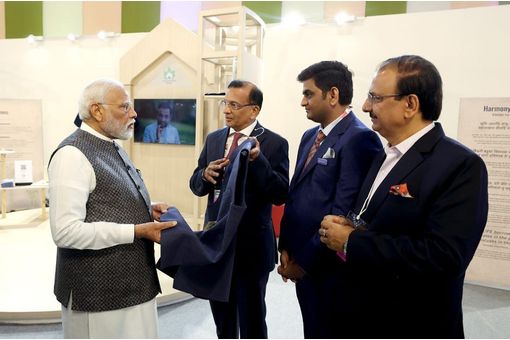Interviews
News Flash
GE's textile researcher talks about cloth care basics
12 Apr '12
4 min read
When it comes to laundry, everyone has a routine. But are your laundry habits beneficial to you and your clothes? Dr. Elizabeth Easter, professor and textile consultant for GE Clothes Care, breaks down the basics.
Over the course of time, washing and line drying instead washing and drying in the dryer won't extend the life of your favorite yoga pants. During the first initial washes, line drying may lessen some shrinkage, but over time the shrinkage to any garment will occur anyway. Delicates or sweaters that need to be reshaped should still be hung on the line or laid flat to dry, as per the care label.
The GE Profile dryer offers a line dry and baffle dry system for use within the dryer. It uses heat and air movement to dry items, without the tumble of regular drying.
Not only is washing small loads harder on the environment, it's also not beneficial to the cleanliness of your clothes. Dr. Easter advises against overloading your washing machine, but running a cycle on a full load will get your clothes just as clean as a small load. With today's washers, like the GE Profile Frontload running at 4.3 cubic ft. capacity, you can fit a lot in one wash cycle. That cuts down on time you spend doing laundry and the impact on the environment.
“Wet clothes left in the washer overnight can increase the potential transfer of color staining,” says Dr. Easter. GE Profile Frontload washer's innovative "Overnight Ready" cycle washes clothes, then removes so much moisture that clothes are comfortable to wear without transferring to the dryer.
It's the first unit in the industry with the ability to wash small loads on an overnight cycle. The cycle even helps prevent clothes wrinkling compared to clothes that are left sitting in the washer overnight. The Overnight Ready cycle keeps clothes moving gently up to eight hours to remove moisture content.
According to Dr. Easter, the chemical reaction between fabric softener and detergent can render the other inactive. Only add fabric softener at the beginning of a wash load if your machine has an auto dispense.
Follow the recommended dosage based on load size and soil level. Too much detergent can cause over-sudsing in the washer and result in a rough feel to clothes. GE's Profile Frontload offers a SmartDispense pedestal which takes the guesswork out of how much detergent and fabric softener to add, and when. It automatically dispenses fabric softener and laundry detergent at ideal times during the wash cycle.
The pedestal, sold separately from the washer, holds three containers where consumers can add whatever laundry products they need. From basic laundry detergent to Woolite, the SmartDispense option adds just the right amount of detergent or fabric softener based on load type and size.
While 75 percent of the market uses liquid detergents, a powder detergent still reigns supreme when it comes to certain types of soils. Heavy soils, like dirt, are best removed with a powder detergent, but ridding your shirts of body oils and cooking oils fares better with a liquid brand. GE's Profile Frontload can also help you remove stubborn stains, with 40 pre-programmed stains. Select the type of stain plaguing your pajamas, from coffee to mouthwash, and let the machine work out the stain for you.
Over the course of time, washing and line drying instead washing and drying in the dryer won't extend the life of your favorite yoga pants. During the first initial washes, line drying may lessen some shrinkage, but over time the shrinkage to any garment will occur anyway. Delicates or sweaters that need to be reshaped should still be hung on the line or laid flat to dry, as per the care label.
The GE Profile dryer offers a line dry and baffle dry system for use within the dryer. It uses heat and air movement to dry items, without the tumble of regular drying.
Not only is washing small loads harder on the environment, it's also not beneficial to the cleanliness of your clothes. Dr. Easter advises against overloading your washing machine, but running a cycle on a full load will get your clothes just as clean as a small load. With today's washers, like the GE Profile Frontload running at 4.3 cubic ft. capacity, you can fit a lot in one wash cycle. That cuts down on time you spend doing laundry and the impact on the environment.
“Wet clothes left in the washer overnight can increase the potential transfer of color staining,” says Dr. Easter. GE Profile Frontload washer's innovative "Overnight Ready" cycle washes clothes, then removes so much moisture that clothes are comfortable to wear without transferring to the dryer.
It's the first unit in the industry with the ability to wash small loads on an overnight cycle. The cycle even helps prevent clothes wrinkling compared to clothes that are left sitting in the washer overnight. The Overnight Ready cycle keeps clothes moving gently up to eight hours to remove moisture content.
According to Dr. Easter, the chemical reaction between fabric softener and detergent can render the other inactive. Only add fabric softener at the beginning of a wash load if your machine has an auto dispense.
Follow the recommended dosage based on load size and soil level. Too much detergent can cause over-sudsing in the washer and result in a rough feel to clothes. GE's Profile Frontload offers a SmartDispense pedestal which takes the guesswork out of how much detergent and fabric softener to add, and when. It automatically dispenses fabric softener and laundry detergent at ideal times during the wash cycle.
The pedestal, sold separately from the washer, holds three containers where consumers can add whatever laundry products they need. From basic laundry detergent to Woolite, the SmartDispense option adds just the right amount of detergent or fabric softener based on load type and size.
While 75 percent of the market uses liquid detergents, a powder detergent still reigns supreme when it comes to certain types of soils. Heavy soils, like dirt, are best removed with a powder detergent, but ridding your shirts of body oils and cooking oils fares better with a liquid brand. GE's Profile Frontload can also help you remove stubborn stains, with 40 pre-programmed stains. Select the type of stain plaguing your pajamas, from coffee to mouthwash, and let the machine work out the stain for you.
Popular News
Leave your Comments
Editor’s Pick
Kimberly Morgan and Rik Veltman
K3 Business Technology Group PLC
































-Ltd..jpg?tr=w-120,h-60,c-at_max,cm-pad_resize,bg-ffffff)





.jpg?tr=w-120,h-60,c-at_max,cm-pad_resize,bg-ffffff)
.jpg?tr=w-120,h-60,c-at_max,cm-pad_resize,bg-ffffff)






